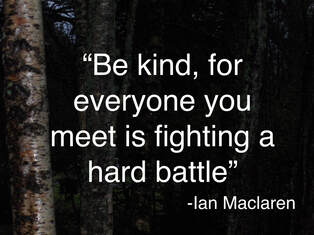|
This will probably be short, else I risk sounding preachy. But I've been silent for a few weeks because life got in the way and it has reminded me if a simple lesson.
"Be kind, for everyone you meet is fighting a hard battle." It's attributed to Ian Maclaren, but motivational posters abound. I prefer an extended version: "Be kind, for everyone is fighting a battle you know nothing about." I have a secret. Perhaps some of those who read this will know what I'm referring to, but they will be few. It's not important what the secret is. I'm almost back to normal (or at least what I consider my normal) but, for one week, I have carried my secret around. I have been pretending to be fine this week. I was chatting with a friend who struggles with chronic pain and depression. We got to talking about how little we know about the people around us. It's part of our culture to ask "How are you?" but then the "correct" answer is "good" or "fine," even if it's a lie. We ask, but we don't expect anyone to answer honestly. Why even ask? Because it's polite. And why do we lie in our answer? Those who are suffering do not wish to burden others. Why discuss how much your disease makes you hurt today? Or how terrible of a day you've had? Why complain when the person in front of you cannot help? I don't expect people to change that cultural habit. I'll still say "okay" when someone asked the inevitable "How are you?" but I want people to remember to be patient with others. You do not know what another person's secret is. "Be kind, for everyone you meet is fighting a hard battle."
0 Comments
The slogan for the conference in Nanaimo, BC (just up the road from me by 2 hours) was "Where will my words take me?" It was an eclectic mix, ranging from poetry to genre fiction. It reached out to publishing, contracts, and editing as well.
This conference was less frantic than others I had attended. There were opportunities to do two or three topics a day, no more. Evenings had social events. At the same time, I came out with new information that made the trip up and hotel costs well worth it. #1 Fantasy is hard. This is not to say that crime is easier. Or romance. Or poetry. I couldn't write a poem without resorting to couplets if my life depended on it! But the fantasy genre was not a huge presence, I suspect because it's difficult. I was thrilled to find an excellent talk by Jo-Anne McLean exclusively for fantasy writers. Her author page is HERE. It put me at a table with ten other writers who wrote fantasy in one form or another. I may offend some people, but I think creative non-fiction is more straight forward. While a great story can still be killed by a lousy writer, at least the characters, world, and plot are pre-determined. Fantasy makes us build it all from scratch. That's hard. #2 Genres confuse everyone! I am not alone! After researching genres extensively, people have started asking me where a book lands among genres and I often do not know the answer! All stories are not quite the same as the stereotypes of their genre. That's a good thing! Dragon's Voice is definitely a fantasy action and adventure story. I wrote it to have a product that fits into a category. But the World of Taint walks a line between epic fantasy and action and adventure, with some dragon and magical creatures tossed in. So where does it fit? I learned I should look at the Book Industry Study Group website for the BISAC codes. Find the one that fits best. It won't fit perfectly! Then find a second, because that helps marketing. That becomes the genre. Apparently, if you ask Amazon via email, they may allow you to select up to ten categories when you market your book. That will be handy for some! #3 I need an editor As someone who loves to edit and has stories around 100,000 words on average, this news disappointed me. Thrillers, crime, romance and other such genre fiction usually run shorter than fantasy. Science fiction is the only one who matches our penchant for loquaciousness. Hiring an editor is not a $500 investment; it's worth over $1000. Looking at my eleven completed novels make this number daunting. I have decided to take it a book at a time. Even professional editors said they use an independent editor for their books. Authors are too close to the manuscript and miss things, even if they are editors themselves! And it doesn't matter if you're going traditional, said one well-published author with thirty years of experience (ok, it was Betsy Warland. Website HERE). As much as we want to think the publisher will do edits for us, they are looking for manuscripts that don't require the effort. So hire-ye an editor. (I did learn about PEAVI.com, which sound like a friendly, local group.) #4 You can fake it I'm an introvert, but I faked being an extravert for the weekend. I engaged with people at the table across from me, asked their name, what they wrote, where they were at in the process, how they were enjoying the conference and a million other things. I got to know a dozen people. For someone daunted by networking, I surprised myself. I now need to buy a business-card holder to keep track! It was exhausting, but without someone to start the conversation, most authors would remain silent. We are a shy lot, happy to sit at our keyboards anonymously and do our own thing. That's the writing part we love so much. But marketing and publishing are not the same. So I learned to fake it to a debatable level of authenticity. #5 The most valuable piece of advice I have to thank Jo-Anne McLean for this one. It was her last tip, and it resonated with me: "Writing is not a competitive sport." I have been working on self-publishing, feeling intimidated by the need to get through the 'noise' of the genre and somehow come to the surface of the flood of ebooks online. But a reader doesn't stop at one book. Just because they read someone else's, it doesn't mean they won't read yours! Having any book out there to get them interested in the genre helps all writers. We're a team. I have felt the love of the writing community, a family that sees beyond genre and accepts that you too hear voices in your head and have characters that take your story somewhere you never expected. My teammates sympathize with getting stuck on a climax or finding time to put words on a page and have tips for improving your craft. We support each other because when a reader reaches for a second, third, or fifty-second book, we all win. I hope all writers can learn to recognize this. |
D. Lambert, authorFantasy novels that entice, inspire, and entertain. Archives
May 2024
Categories |


 RSS Feed
RSS Feed